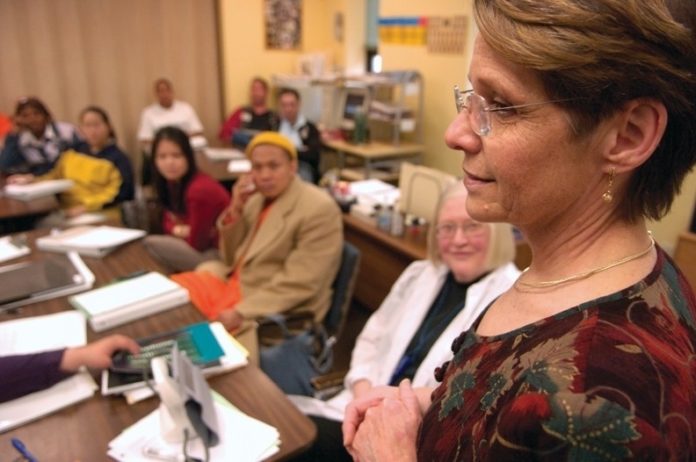
The challenge is greatest for people who don’t speak English, or for those whose education is so limited that reading anything is difficult, so deciphering a pill bottle is hopeless.
But at some level or another, experts say, we all struggle with health literacy. We may know what high blood pressure is, for example, but do we really understand what causes it, or how a beta blocker can help protect us, or how to care for our parent after heart surgery?
That is the insight behind the Rhode Island Health Literacy Project: Health care is complicated, and to care for ourselves and help doctors care for us requires basic knowledge and skills that not all of us have.
Formed in July 2005, the project was inspired by a report from the Institute of Medicine that showed 90 million American adults, or 47 percent of the total, were disconnected from the U.S. health care system because they were health illiterate.
Rhode Island, with its large urban population and thousands of new immigrants, struggles with this problem. And while the RIte Care program has addressed it, to some extent, with Medicaid beneficiaries, no one had looked at the big picture like this.
“We see it every day with our students,” said Brenda Dann-Messier, president and CEO of Dorcas Place, which as an adult education center serves a particularly vulnerable population. Health problems are one of the top reasons why students drop out, she said, and many struggle to care for themselves. Yet people didn’t talk about health literacy.
“Now we recognize that it has a tremendous impact,” she said. “I also think the growing immigrant population has also shone a real spotlight on the problem. … We just can’t hide the issue anymore.”
The project grew out of a meeting sponsored by Blue Cross & Blue Shield of Rhode Island, and it brought people together from Brown University, Quality Partners of Rhode Island, the Hospital Association of Rhode Island, the Rhode Island Medical Society, the R.I. Department of Health, the Rhode Island Health Center Association, the Rhode Island State Nurses Association, the International Institute, Dorcas Place and others.
The group started developing a health literacy curriculum, trying to create materials that could be used by a wide range of audiences, covering a variety of topics.
They held their first classes on the topic at Dorcas Place in the spring of last year. An article in Choices, the Blue Cross subscriber magazine, noted a young woman’s answer when asked whether it was hard sometimes to understand doctors’ instructions.
“They have the tendency of using big medical terms,” she said. “Sometimes the words are so big that if you’re not a smart or well-educated person, you’re not going to understand what the word is.”
Dann-Messier said the classes brought up big concerns for many students, from dangerously high blood pressure to mental health issues. To help students care for themselves and find their way through the medical system, Dorcas Place has built health care topics into its adult education curriculum, and it’s also having Blue Cross teams come periodically to offer blood pressure and cholesterol screenings, among other things.
At the Health Literacy Project, meanwhile, the curriculum has been refined and expanded, and last fall, the group decided to start a “Health Literacy on the Road” program.
So far this year, Westerly Hospital and Memorial Hospital of Rhode Island have sponsored one session each, both on taking medications safely. And Roger Williams Medical Center, which is promoting health literacy on its own through a community “medical school,” hosted a session on end-of-life discussions and advance directives.
And now, to address the other key piece of the puzzle – health care providers – the group has produced a “toolkit” for them, a binder packed with useful materials they can give their patients, in multiple languages, as well as materials to help them communicate better, bridge cultural gaps, and make patients feel comfortable asking all the questions they need to ask.
“Individuals often will listen to their physicians before they’ll listen to anybody else, so we want to educate the doctors so they can better educate their patients,” said Lori Quaranta, who chairs the project committee.
Dr. James Burrill, a Blue Cross medical director and a committee member, said he expects the toolkit to be particularly helpful to providers working “in a cross-cultural setting,” with people from different countries, with different value systems, maybe different languages.
Just last week, Burrill gave a toolkit to a doctor in Warren who told him most of his patients are Portuguese women who aren’t used to making appointments to see a doctor. Rather they just walk in and wait all day, if needed, to be seen. Talking about advance directives, the doctor told Burrill, is “very difficult,” because of the women’s religious beliefs.
But all kinds of physicians could find useful materials in the toolkit, Burrill said, and they could benefit from the approach it encourages. In his own practice, he noted, he asks patients to write down questions in the waiting room, and he reads their charts and puts Post-It notes on them with reminders before he sees them, to ensure they cover key topics.
Helping educate patients is particularly important with the push for consumers to take a more active role in managing their care, Quaranta said.
“We are asking people to take more and more responsibility,” she said, “and if we’re going to do that, we need to do a better job across the board in explaining and making sure people understand their health care decisions.”
The Provider Toolkit and many other materials can be downloaded at www.rihlp.org.










